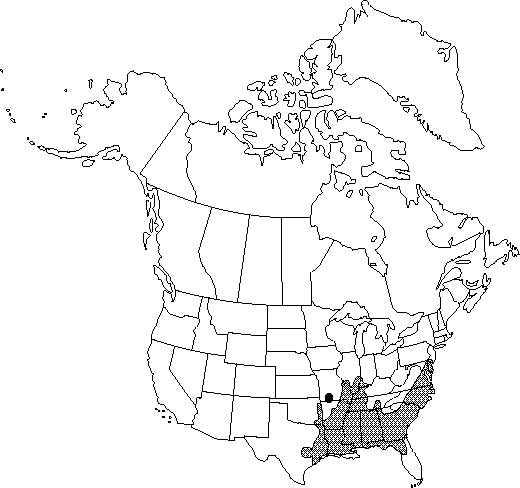Quercus lyrata
Fl. Carol., 235. 1788.
Trees, deciduous, to 20 m. Bark light gray, tinged with red, with thick plates underlying scales. Twigs grayish or reddish, (2-)3(-4) mm diam., villous, soon glabrate. Buds 3 mm, gray-puberulent. Leaves: petiole 8-20(-25) mm. Leaf blade obovate or broadly obovate, 100-160(-200) × 50-100(-120) mm, base narrowly cuneate to acute, margins moderately to deeply lobed, lobes somewhat to sharply angular or spatulate, often with 2-3 teeth, sinuses nearly to midrib, secondary veins arched, divergent, (3-)5-7 on each side, apex broadly rounded or ovate; surfaces abaxially light green or somewhat glaucous, tomentose, tomentum persisting or soon falling, adaxially dark green or dull gray, sparsely puberulent to glabrate. Acorns 1-2 on axillary peduncles to 40 mm; cup goblet-shaped, burlike, or spheroid, 15-20 mm deep × 20-30 mm wide, usually completely enclosing nut or merely apex visible, rarely enclosing only 1/2 nut, orifice smaller than nut diameter, often splitting irregularly at maturity, scales closely appressed, especially about margin, laterally connate, broadly triangular, keeled-tuberculate, finely grayish tomentose; nut light brown or grayish, ovoid-ellipsoid or oblong, (15-)25-50 × (10-)20-40 mm, finely puberulent or floccose. Cotyledons distinct.
Phenology: Flowering spring.
Habitat: Bottoms, lowlands, wet forest, streamside forests, swamp forests, periodically inundated areas
Elevation: 0-200 m
Distribution

Ala., Ark., Del., Fla., Ga., Ill., Ind., Iowa, Ky., La., Md., Miss., Mo., N.J., N.C., Okla., S.C., Tenn., Tex., Va.
Discussion
The large acorns with hardened cups that enclose all or most of the nut are diagnostic.
Selected References
None.
